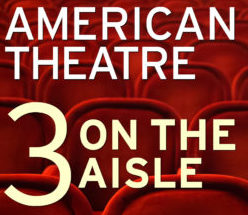 “Writing free verse is like playing tennis with the net down.”
“Writing free verse is like playing tennis with the net down.”
Robert Frost, address at Milton Academy, Massachusetts, May 17, 1935
Terry Teachout on the arts in New York City
 Here’s my list of recommended Broadway, off-Broadway, and out-of-town shows, updated weekly. In all cases, I gave these shows favorable reviews (if sometimes qualifiedly so) in The Wall Street Journal when they opened. For more information, click on the title.
Here’s my list of recommended Broadway, off-Broadway, and out-of-town shows, updated weekly. In all cases, I gave these shows favorable reviews (if sometimes qualifiedly so) in The Wall Street Journal when they opened. For more information, click on the title.
BROADWAY:
• The Band’s Visit (musical, PG-13, virtually all shows sold out last week, reviewed here)
• Dear Evan Hansen (musical, PG-13, all shows sold out last week, reviewed here)
• Hamilton (musical, PG-13, Broadway transfer of off-Broadway production, all shows sold out last week, reviewed here)
• My Fair Lady (musical, G, nearly all shows sold out last week, reviewed here)
CLOSING SOON OFF BROADWAY:
• Be More Chill (musical, PG-13, closes Sept. 30, reviewed here)
CLOSING NEXT WEEK IN EAST HADDAM, CONN.:
• Oliver! (musical, PG-13, closes Sept. 13, reviewed here)
CLOSING NEXT WEEK IN CAPE MAY, N.J.:
• The Lion in Winter (drama, PG-13, closes Sept. 14, reviewed here)
CLOSING TONIGHT OFF BROADWAY:
• On a Clear Day You Can See Forever (musical, G, too complex for children, reviewed here)
 “I own any form of humor shows fear and inferiority. Irony is simply a kind of guardedness. So is a twinkle. It keeps the reader from criticism. Whittier, when he shows any style at all is probably a greater person than Longfellow as he is lifted priestlike above consideration of the scornful. Belief is better than anything else, and it is best when rapt, above paying its respects to anybody’s doubt whatsoever. At bottom the world isn’t a joke. We only joke about it to avoid an issue with someone to let someone know that we know he’s there with his questions: to disarm him by seeming to have heard and done justice to this side of the standing argument. Humor is the most engaging cowardice.”
“I own any form of humor shows fear and inferiority. Irony is simply a kind of guardedness. So is a twinkle. It keeps the reader from criticism. Whittier, when he shows any style at all is probably a greater person than Longfellow as he is lifted priestlike above consideration of the scornful. Belief is better than anything else, and it is best when rapt, above paying its respects to anybody’s doubt whatsoever. At bottom the world isn’t a joke. We only joke about it to avoid an issue with someone to let someone know that we know he’s there with his questions: to disarm him by seeming to have heard and done justice to this side of the standing argument. Humor is the most engaging cowardice.”
Robert Frost, letter to Louis Untermeyer (March 10, 1924)
 Robert Frost: A Lover’s Quarrel with the World, a 1963 documentary directed by Shirley Clarke, written by Robert Hughes, and featuring on-screen appearances by Frost, Frost, John F. Kennedy, Lyndon B. Johnson, Randall Jarrell, G. Armour Craig, and Louis Untermeyer. Originally telecast on WGBH-TV, it won an Academy Award for Best Documentary Feature:
Robert Frost: A Lover’s Quarrel with the World, a 1963 documentary directed by Shirley Clarke, written by Robert Hughes, and featuring on-screen appearances by Frost, Frost, John F. Kennedy, Lyndon B. Johnson, Randall Jarrell, G. Armour Craig, and Louis Untermeyer. Originally telecast on WGBH-TV, it won an Academy Award for Best Documentary Feature:
(This is the latest in a series of arts- and history-related videos that appear in this space each Monday, Wednesday, and Friday)
 “Scholars and artists thrown together are often annoyed at the puzzle of where they differ.Both work from knowledge; but I suspect they differ most importantly in the way their knowledge is come by. Scholars get theirs with conscientious thoroughness along projected lines of logic; poets theirs cavalierly and as it happens in and out of books. They stick to nothing deliberately, but let what will stick to them like burrs where they walk in the fields.”
“Scholars and artists thrown together are often annoyed at the puzzle of where they differ.Both work from knowledge; but I suspect they differ most importantly in the way their knowledge is come by. Scholars get theirs with conscientious thoroughness along projected lines of logic; poets theirs cavalierly and as it happens in and out of books. They stick to nothing deliberately, but let what will stick to them like burrs where they walk in the fields.”
Robert Frost, “The Figure a Poem Makes”
 The eighteenth episode of Three on the Aisle, the twice-monthly podcast in which Peter Marks, Elisabeth Vincentelli, and I talk about theater in America, is now available on line for listening or downloading. In fact, Episode 18 has been available for the past few days, but I was so swamped by Mrs. T’s illness that I forgot all about it—in part because I wasn’t in it. I was at Mrs. T’s side in the Cape May ICU when this episode was taped. Peter and Elisabeth managed perfectly well without me, though, and I commend the results to your attention.
The eighteenth episode of Three on the Aisle, the twice-monthly podcast in which Peter Marks, Elisabeth Vincentelli, and I talk about theater in America, is now available on line for listening or downloading. In fact, Episode 18 has been available for the past few days, but I was so swamped by Mrs. T’s illness that I forgot all about it—in part because I wasn’t in it. I was at Mrs. T’s side in the Cape May ICU when this episode was taped. Peter and Elisabeth managed perfectly well without me, though, and I commend the results to your attention.
Here’s an excerpt from American Theatre’s “official” summary of the proceedings:
This week’s guest is performer Amanda Duarte, who talks about her upcoming show at Joe’s Pub, “Staying Alive,” where she reinvents Bee Gees songs (on Sept. 21). She also talks about her controversial article for Time Out New York on theatre etiquette and how laughing loudly at a show is okay but smacking gum is not….
Peter and Elisabeth wrap things up as usual with a discussion of recent productions, in New York and elsewhere, that they’ve seen and liked—or not.
To listen, download the latest episode, read more about it, or subscribe to Three on the Aisle, go here.
In case you missed any previous episodes, you’ll find them all here.
Needless to say, I’ll be back next time!
 Mrs. T and I are putting our lives back together after her unexpected hospital stay. It’s taken some doing. Our Manhattan apartment already looked fairly chaotic by the time she was discharged from New York-Presbyterian Hospital last Thursday afternoon. I’d just spent three weeks at or near her bedside, and I didn’t much feel like picking up after myself when I got home each night. From then on, things went straight from bad to worse. I was too tired to do anything not absolutely essential, while Mrs. T spent most of the weekend sleeping, something you rarely get to do in an intensive-care unit. Before long, the place looked as though it had been tossed by a heister in a hurry. Empty boxes, medical waste, flowers from friends, spare oxygen tanks: all were flung at random around the living room, and the kitchen was messier still, littered by the debris of our catch-as-catch-can meals. The art on the walls seemed to look down reproachfully at the rude company it kept.
Mrs. T and I are putting our lives back together after her unexpected hospital stay. It’s taken some doing. Our Manhattan apartment already looked fairly chaotic by the time she was discharged from New York-Presbyterian Hospital last Thursday afternoon. I’d just spent three weeks at or near her bedside, and I didn’t much feel like picking up after myself when I got home each night. From then on, things went straight from bad to worse. I was too tired to do anything not absolutely essential, while Mrs. T spent most of the weekend sleeping, something you rarely get to do in an intensive-care unit. Before long, the place looked as though it had been tossed by a heister in a hurry. Empty boxes, medical waste, flowers from friends, spare oxygen tanks: all were flung at random around the living room, and the kitchen was messier still, littered by the debris of our catch-as-catch-can meals. The art on the walls seemed to look down reproachfully at the rude company it kept.
You can’t go on living like that forever, and we didn’t. I got around to shaving and showering on Sunday. Come Monday afternoon, the dirty dishes were done and put away, the trash had been carted downstairs, and our home, which under normal circumstances suggests a cross between a library and an art gallery, was visible once more to the naked eye. I’ve even started writing again, though my mental muscles are slack from a disorienting combination of extreme overuse (I turned out a pair of Wall Street Journal obituaries on very tight deadlines last week) and total disuse, just as Mrs. T’s leg muscles, weakened by three weeks in bed, remain reluctant to serve her properly.
 In addition, both of us are bone-tired in other, subtler ways. It’s only just starting to hit us that Mrs. T came very, very close to dying in Cape May. Midway through her first day in the emergency room, a nurse casually remarked that she had almost “bled out” in our hotel room that morning. It took time for those deceptively innocent-sounding words to register, but when they did, they landed like a hand grenade. Even then, all we could think about was the next thing we had to do. We had no time to consider the implications of what doing it—or failing to do it—might mean. Now, by contrast, we find ourselves chatting regularly and with still-raw astonishment about her brush with death. It’s as though we’d joined hands and leaped across the Grand Canyon without advance planning and are looking back at it from the other side, stunned to see how far we traveled.
In addition, both of us are bone-tired in other, subtler ways. It’s only just starting to hit us that Mrs. T came very, very close to dying in Cape May. Midway through her first day in the emergency room, a nurse casually remarked that she had almost “bled out” in our hotel room that morning. It took time for those deceptively innocent-sounding words to register, but when they did, they landed like a hand grenade. Even then, all we could think about was the next thing we had to do. We had no time to consider the implications of what doing it—or failing to do it—might mean. Now, by contrast, we find ourselves chatting regularly and with still-raw astonishment about her brush with death. It’s as though we’d joined hands and leaped across the Grand Canyon without advance planning and are looking back at it from the other side, stunned to see how far we traveled.
Mrs. T, to be sure, has had plenty of time to get used to living with a chronic illness, insofar as it’s possible to do so. As for me, I’ve been seriously ill just three times in my life, once as a child and twice as an adult, the last time early in the history of this blog. Never, though, have I come as close to the Dark Encounter as did Mrs. T. When something like that happens, whether to you or your partner, you can’t help but be changed by it. It stands to reason, then, that we should be finding it a bit hard to dust ourselves off and start all over again. At least for now, both of us feel more inclined to reflect on what nearly was, and what it would have been like for me had our shared life been cut short.
A few days after my own brush with death in 2005, I wrote these words:
I already knew one thing that was at least as important: whatever the verdict, I wasn’t going to give up without a fight. I have music to hear, plays to review, paintings to see, etchings to buy and treasure, a book to finish writing, a blog to keep, dozens of friends who claim quite convincingly to love me, and many, many memories, a few dark and desperate, far more full of light. In the last few days alone countless things have happened, small and large, that make me want to cling as fiercely as possible to whatever time remains on the ticking clock whose face I cannot see.
 We’re not quite there yet, but we’re on the way. In fact, our zest for life has already started to revive. We’re watching old movies together every night, and I’m looking forward to the next play I’ll be seeing and reviewing. To be sure, there’s much to be done between now and then: laundry, shopping, follow-up visits to a variety of doctors, bulging suitcases that remain as yet unpacked. And we continue to speculate on the meaning and effects of the near-perfect storm of illness through which the two of us have passed.
We’re not quite there yet, but we’re on the way. In fact, our zest for life has already started to revive. We’re watching old movies together every night, and I’m looking forward to the next play I’ll be seeing and reviewing. To be sure, there’s much to be done between now and then: laundry, shopping, follow-up visits to a variety of doctors, bulging suitcases that remain as yet unpacked. And we continue to speculate on the meaning and effects of the near-perfect storm of illness through which the two of us have passed.
Henry James said it: we shall never be again as we were. But what of it? Mrs. T, my life’s companion and ever-affirming flame, is still alive. Next to that, nothing else matters, now and always.
* * *
Fred Astaire and Ginger Rogers sing and dance to “Pick Yourself Up,” by Jerome Kern and Dorothy Fields, in Swing Time, directed by George Stevens:
Elaine Stritch sings Stephen Sondheim’s “I’m Still Here” (from Follies) at his eightieth-birthday concert in 2010, accompanied by Paul Gemignani and the New York Philharmonic:
I’ve been reading Thomas A. Heinz’s Frank Lloyd Wright Field Guide, a book that describes every surviving building designed by Wright, tells you how to get to them, and assigns each one a five-star rating. The Field Guide also includes a brief discussion of the relative accessibility of each building. In most cases it’s a single sentence, usually either “The house can be seen from the street” or “The house cannot be seen from the street.” In certain cases, however, Heinz goes a bit further, and on occasion he really lets himself ago….
Read the whole thing here.
An ArtsJournal Blog